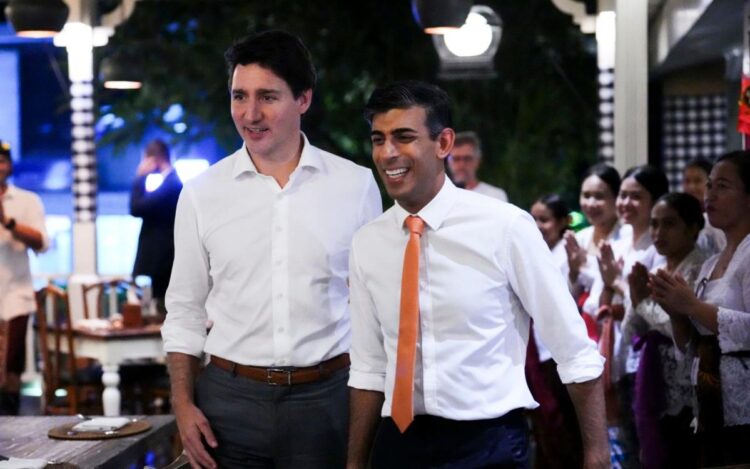
Slashing public spending. Tearing up our arbitrary net zero targets. Privatising healthcare, liberalising planning, deregulating our labour market. These may be desirable policies that could get the British economy growing again, breaking us out of the doom-loop of stagnation, rising taxes and higher inflation – but they would be very difficult to implement.
Yet we may not need such a radical agenda to turn the UK economy around: currently, even Justin Trudeau’s ultra-woke Canada is beating us on growth. With moderate reforms in just a few areas, particularly climate change, we could significantly improve our performance.
There are plenty of countries the UK could take inspiration from as it searches for a model of growth. Singapore, with its 17pc corporation tax rate and open business environment. Or the US, with its lower tax burdens and huge technology industry.
The trouble is, those are far too extreme for many British voters (and, for that matter, MPs). Adopting a raft of policy ideas from either country will quickly be dismissed by a political and financial elite that is terrified of appearing “reactionary” or “populist”. But perhaps, and somewhat incredibly, there is another country that we could usefully take as a role model: Canada.
Sure, Trudeau’s government rarely misses an opportunity for sanctimonious virtue-signalling. No one could possibly describe it as “far-right”. It has introduced gender-neutral uniforms in the armed forces and experimented with decriminalising hard drugs.
But look at its economic figures. This year, Canada will be the second-fastest growing economy in the G7 after the US, and it will hold onto that slot next year, before moving up to first place in 2025, according to economic forecasts compiled by Bloomberg. Its GDP is expected to increase to 2.3pc in 2025, compared with around 1pc here.
Canada’s stock market has outperformed all its major rivals since 2021. It is experiencing population growth and close to record-low levels of unemployment. At 4.4pc, inflation is running at half our rate, and its GDP per capita is $58,000, compared to the UK’s $54,000. And despite high levels of spending during the pandemic, its debt to GDP ratio is relatively low.
The UK’s just pushed through the 100pc barrier, with expectations it will continue to rise. Canada has plenty of challenges, but its economy is performing far better than ours.
There are many reasons why Canada is booming, but one is fracking, which has been outlawed here. Far from loosening rules, Labour is planning a complete ban on new licences for conventional drilling in the North Sea should it come to power next year.
Canada has developed a successful shale gas sector – it was the first country outside the US to see large-scale development of shale resources.
It has long provided support to the oil and gas industry. Indeed, investment in the industry is expected to rise by another 11pc this year, according to the Canadian Association of Petroleum Producers, and demand is still high.
Calls for a windfall tax last year, meanwhile, were immediately rejected by Trudeau’s government for fear they would do more harm than good. Such arguments were dismissed in Britain, which now has a headline tax rate on North Sea oil and gas of 75pc. Investment has fallen, career opportunities gone. Offshore Energies UK have warned that Labour’s ban would lead to 45,000 job losses and a 60pc drop in domestic production.
While the commitment is certainly there to combat climate change – indeed, their government seemingly never misses an opportunity to sign up to the newest target at the latest global conference – it perhaps is more realistic than we are here.
Only a couple of areas are attempting to mandate heat pumps. While Canada is aiming to achieve a net-zero economy by 2050, it has so far taken a less cavalier attitude towards imposing extreme costs on businesses and households.
Perhaps its government has in mind estimates that Canada’s natural gas production would plunge by 37pc-68pc by 2050, according to some estimates, if the country reached its emissions goal, which would risk upending the nation’s long-term LNG export aspirations.
Or take immigration. Canada has embarked on a huge expansion of its population, welcoming half a million newcomers last year, a similar number to the UK on a per capita basis. And yet it also has a points-based system, intended to attract people with valuable skills.
Further, the Fraser Institute’s latest Economic Freedom report gives Canada a higher score on regulation, and legal systems and property rights. In the overall rankings, it comes in 16th place to the UK’s 22nd.
Britain desperately needs to work out how to start growing its economy again. We are fast becoming an international outlier, with one of the highest rates of inflation in the developed world. Mortgage rates hikes could threaten thousands with repossession. Wages are stagnant, often falling in real terms. Taxes have risen to 70-year highs.
Many will still hope that Britain can become Singapore-on-Thames, with a radically low-tax, deregulated economy. But we need a dose of realism, and who knew it could come from ultra-liberal, woke Canada.
We certainly wouldn’t want to mirror all the country’s policies – it has a corporation tax rate of 38pc, for a start (although there is a 10pc rebate on income earned in Canadian provinces).
But we could stop posing and start drilling: in 2013 the British Geological Survey estimated that the Bowland, a thick seam of shale across Lancashire and Yorkshire, could alone yield up to 13,000 billion cubic metres of natural gas.
Had we extracted just 10pc, we could have heated homes for around half a century. Instead of relying on expensive imports and driving up bills, we could frack. And we could do that by pointing to Trudeau’s Canada.
[ad_2]
Source link







